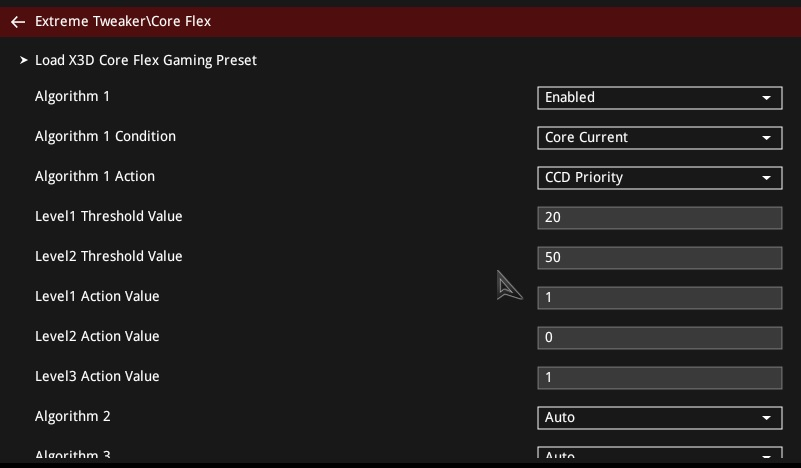Beta BIOS Lets You Prioritize CCDs on AMD's 7000X3D CPUs
With settings tweaks, you can pick which CCD gets triggered.
Get Tom's Hardware's best news and in-depth reviews, straight to your inbox.
You are now subscribed
Your newsletter sign-up was successful
AMD's upcoming line of 7000X3D processors, which includes the Ryzen 9 7950X3D, Ryzen 9 7900X3D and Ryzen 7 7800X3D, promise amazing gaming performance thanks to copious amounts of 3D V-Cache. However, these new processors apply the cache to only one of the two CCDs (Complex Core Dies) that make up the chip architecture so your software and firmware need to make sure that games utilize the correct CCD or you won't get the performance benefits. For non-gaming tasks, the CCD without cache could be a better choice as it can hit higher boost clocks.
When it comes to assigning tasks to cores (or CCDs), both the OS and the firmware can sometimes make mistakes, sending priority workloads to slower threads. Fortunately, you may soon be able to tweak the CCD priority in your BIOS, allowing you to have fine-grain control over which cores get which tasks in a way that's independent of the OS.
Twitter user HXL (@9550pro) has shared screen shots from a new Asus X670 Beta BIOS (version 0921 to be precise) that show a number of advanced settings you can use to control the X3D cores. These images appear to have first shown up on Asus' forums. These settings include a number of different algorithm conditions and actions that can trigger the correct CCD core. HXL notes that, since these settings are built into the BIOS, they are OS agnostic.


These tweaks are important for non-gaming workloads because, as we reported yesterday, the Ryzen 9 7950X3D in particular is rumored to have lower frequencies on its V-Cache CCD than the cheaper 7800X3D has. The 7950X3D has eight cores in each of its two CCDs.
AMD has also gone on record saying that the non-V-Cache CCDs can achieve higher clocks. In an interview with PC World in January, AMD director of product management Scott Stankard said that "by not stacking one of the CCDs, it let us push the 1T boost, the maximum T boost, up to 5.7 GHz."
| CPU | Price | Cores / Threads (P+E) | P-Core Base / Boost Clock (GHz) | Cache (L2/L3) | TDP |
|---|---|---|---|---|---|
| Ryzen 9 7950X3D | $699 | 16 / 32 | 4.2 / 5.7 | 144MB (16+128) | 120W |
| Ryzen 9 7900X3D | $599 | 12 / 24 | 4.4 / 5.6 | 140MB (12+132) | 120W |
| Ryzen 7 7800X3D | $449 | 8 /16 | 4.x / 5.0 | 104MB (8+96) | 120W |
More details and links to a download for the beta BIOS are available in this thread on Asus's ROG forum. However, we don't recommend trying a beta BIOS, particularly when the chips themselves won't be available until February 28. Additionally, these files are in a Dropbox linked from a forum, not an official source. For the sake of your machine's security, hold off until something official is available.
What we can glean from this news is that many, if not all, X670 motherboards, including some of the best motherboards will soon get BIOS updates that allow you to fine-tune which workloads get assigned to which CCD. Perhaps other chipsets such as B650 will see these benefits as well. If you end up needing one of these, see our tutorial on how to update the BIOS on a PC.
Get Tom's Hardware's best news and in-depth reviews, straight to your inbox.
Avram Piltch is Managing Editor: Special Projects. When he's not playing with the latest gadgets at work or putting on VR helmets at trade shows, you'll find him rooting his phone, taking apart his PC, or coding plugins. With his technical knowledge and passion for testing, Avram developed many real-world benchmarks, including our laptop battery test.
-
RichardtST Not sure what to think about this. Maybe going a bit too far? I mean, what's next? Will we be able to tweak the microcode and remove instructions we don't use? Will getting rid of the excess x86 micro-bloat make it go faster? That would be a better path... give me a stripped RISC version of the x86.Reply -
Makaveli Having this being accessible in the Bios is huge so you get the benefit on different OS.Reply -
fevanson The more options exposed for tweaking in the bios the better. Locked bioses can limit you once the platform becomes older.Reply -
TerryLaze But no report on what these algorithms look for or do...Reply
The potential for users to screw up and lose a lot of performance is much higher than them being able to eek out more performance.
Intel an MS together and the results are not that great, end users by themselves?!
Maybe it just goes by utilization so anything that doesn't use much CPU just goes to the cache ccd, but low thread count apps also benefit from high clocks. -
dalek1234 Being able to force a specific CCD in BIOS makes sense in case the CCD-assigning algorithem doesn't get it right. What would be really cool if you could do the assigning in the OS (Windows in my case), that way I wouldn't need to shut down the PC to get into the BIOS. I wouldn't be surprised if you will eventually be able to do this in Windows.Reply
Now, when Tom's tests these CPUs, they will probably chose the non-3D-chace CCD when testing games, and the 3D-cache CCD for other test, just to make Intel look better. LOL....sad and funny at the same time. -
rluker5 This sounds like it has a lot of potential to fix CCD assignment issues.Reply
What would be really good is if AMD copied what Intel did with their legacy game mode where you could toggle the use of E-cores with the scroll lock button (useful with Alder, not much gain with Raptor where everything is sorted out), except with AMD it would be some way to choose CCD priority. That way one could easily switch if they had a performance loss.
Maybe something like: alt1 for 3d priority, alt2 for non3d priority, alt3 for just 3d, alt4 for just non. With the last 2 because Windows will probably still behave undesirably in some uses. -
rluker5 Replydalek1234 said:Being able to force a specific CCD in BIOS makes sense in case the CCD-assigning algorithem doesn't get it right. What would be really cool if you could do the assigning in the OS (Windows in my case), that way I wouldn't need to shut down the PC to get into the BIOS. I wouldn't be surprised if you will eventually be able to do this in Windows.
Now, when Tom's tests these CPUs, they will probably chose the non-3D-chace CCD when testing games, and the 3D-cache CCD for other test, just to make Intel look better. LOL....sad and funny at the same time.
I bet Tom's will use whatever is default for simplicity and standard reference and Windows will choose the wrong CCD based on what other processors used and make the performance erratic and underwhelming.
That's why AMD is coming up with solutions, because there is a problem.
With Alder/ Raptor Windows could just assign priority tasks to fastest cores and low priority to slow cores. That is a fairly universal approach. What do you do if a process may or may not run faster on the slower cores depending on the particular task? Sounds like something that could only really be solved on a task by task basis. Too much trouble doing that with Process Lasso for most so maybe an in OS hotkey? -
alceryes "...the Ryzen 9 7950X3D in particular is rumored to have lower frequencies on its V-Cache CCD than the cheaper 7800X3D has..."Reply
This line stood out to me.
7800X3D is the one to get for gaming. Looks like they're keeping the higher binned CCDs for the 7800X3D CPU, or it's faster due to lower thermals (one less heat-producing CCD), or both. -
farmageddon85 Reply
will there be a new roll out of new am5 boards to go with the 7800x3d? im building a new pc and im holding off on gpu mobo and cpu but plan on getting the 7800x3dalceryes said:"...the Ryzen 9 7950X3D in particular is rumored to have lower frequencies on its V-Cache CCD than the cheaper 7800X3D has..."
This line stood out to me.
7800X3D is the one to get for gaming. Looks like they're keeping the higher binned CCDs for the 7800X3D CPU, or it's faster due to lower thermals (one less heat-producing CCD), or both. -
alceryes Reply
It's not needed for the X3D chips. All current boards will be getting a BIOS update to make the most out of the new X3D chip variants.farmageddon85 said:will there be a new roll out of new am5 boards to go with the 7800x3d? im building a new pc and im holding off on gpu mobo and cpu but plan on getting the 7800x3d
